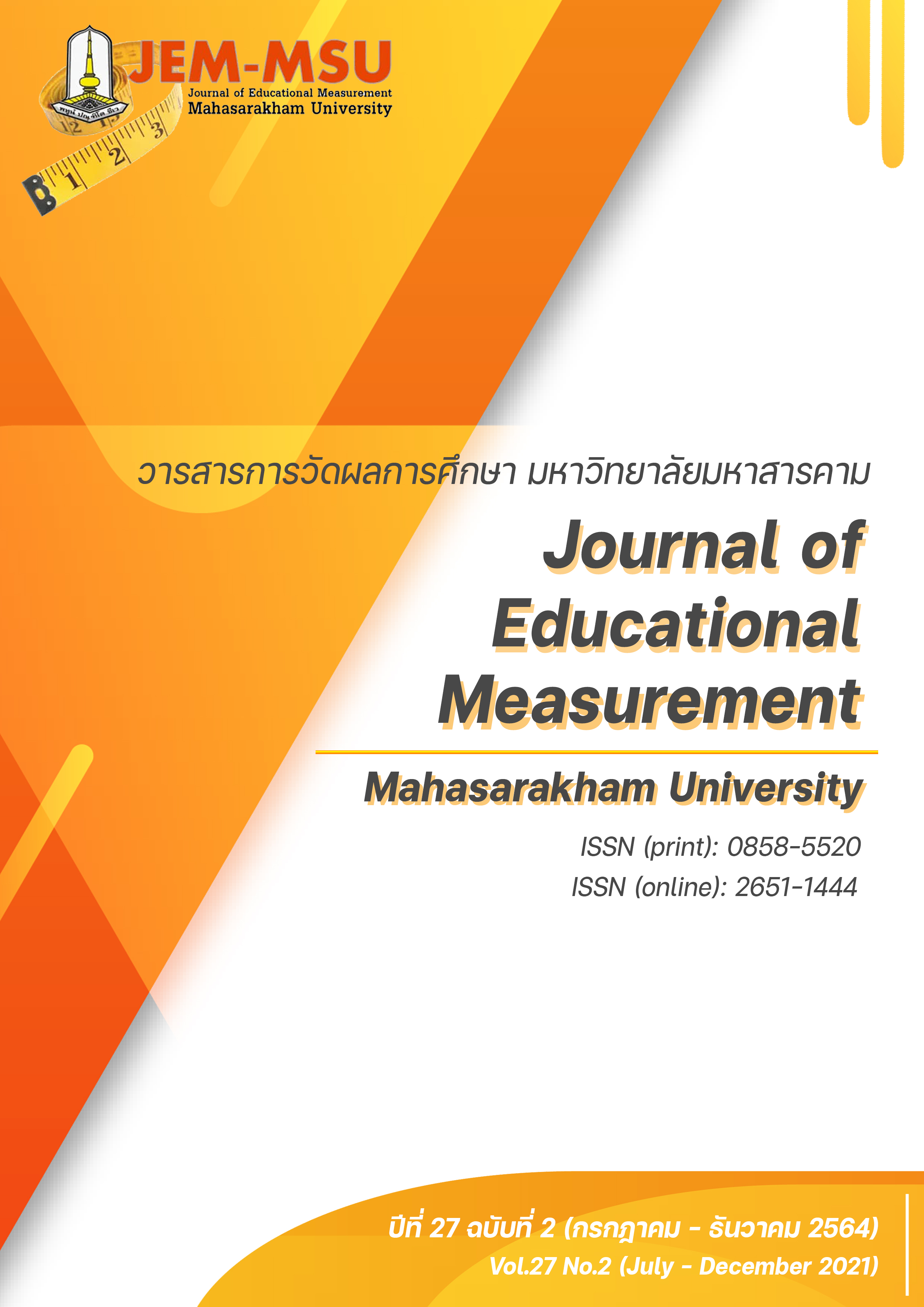Development of Basic Science Process Skills Test of Grade 6 students
Main Article Content
Abstract
The purposes of this research were 1) to check content validity of the basic science process skills test, 2) to analyze item difficulty, item discrimination, and reliability of the basic science process skills test, 3) to check construct validity of the basic science process skills test, and 4) to form normalized scores of the basic science process skills test. The sample comprised 613 grade 6 students from schools under Roi Et Primary Education Service Area Office 1 in the academic year 2019, obtained through multistage random sampling. The instrument was a 4-choice basic science process skill test. The data analysis employed item analysis method following classical test theories for content validity, item difficulty, item discrimination, reliability, and construct validity, employing R statistical program using packages such as CTT, lavaan, psych, and GPArotation. The results showed that 42 items of the test consisted of construct validity, item difficulty from 0.32 to 0.74, item discrimination from 0.21 to 0.55, and Cronbach’s alpha coefficient of 0.85. The test showed construct validity and normalized scores from T19 to T79 which could be used to measure basic science process skills of grade 6 students.
Article Details
The content and information contained in the published article in the Journal of Educational Measurement Mahasarakham University represent the opinions and responsibilities of the authors directly. The editorial board of the journal is not necessarily in agreement with or responsible for any of the content.
The articles, data, content, images, etc. that have been published in the Journal of Educational Measurement Mahasarakham University are copyrighted by the journal. If any individual or organization wishes to reproduce or perform any actions involving the entirety or any part of the content, they must obtain written permission from the Journal of Educational Measurement Mahasarakham University.
References
เบญจมาภรณ์ เสนารัตน์ และ สมประสงค์ เสนารัตน์. (2561). หลักการวัดและประเมินผลทางการศึกษา. พิมพ์ครั้งที่ 4. มหาสารคาม : อภิชาติการพิมพ์.
สุทธิวรรณ พีรศักดิ์โสภณ สุรชัย มีชาญ และสมกิจ กิจพูนวงศ์. (2560). การศึกษาคุณภาพของแบบทดสอบ SWUSAT ที่ใช้ ในการคัดเลือกบุคคลเข้าศึกษาต่อในมหาวิทยาลัยศรีนครินทรวิโรฒ วิเคราะห์โดยใช้ทฤษฎีการทดสอบแบบมาตรฐานเดิมและทฤษฎีการตอบข้อสอบ. รายงานวิจัยสำนักทดสอบทางการศึกษาและจิตวิทยา มหาวิทยาลัยศรีนครินทรวิโรฒ.
ศิริชัย กาญจนวาสี. (2552). ทฤษฎีทดสอบแบบดั้งเดิม. พิมพ์ครั้งที่ 6. กรุงเทพฯ : โรงพิมพ์แห่งจุฬาลงกรณ์มหาวิทยาลัย.
สุวิมล ติรกานันท์. (2548). การตรวจสอบความเป็นเอกมิติ. พิมพ์ครั้งที่ 2. กรุงเทพฯ : โรงพิมพ์แห่งจุฬาลงกรณ์มหาวิทยาลัย.
สำนักงานคณะกรรมการการศึกษาขั้นพื้นฐาน. (2561). การศึกษาทักษะกระบวนการทางวิทยาศาสตร์และผลสัมฤทธิ์ทางการเรียนของนักเรียนในโครงการบ้านนักวิทยาศาสตร์น้อย ประเทศไทย. กรุงเทพฯ : โรงพิมพ์ชุมนุมสหกรณ์การเกษตรแห่งประเทศไทยจำกัด.
อนงค์ แก่นจันทร์. (2556). การพัฒนาชุดการเรียนรู้ในการพัฒนาทักษะกระบวนการทางวิทยาศาสตร์ ขั้นพื้นฐานชั้นประถมศึกษาปีที่ 6. (วิทยานิพนธ์) ครุศาตรมหาบัณฑิต สาขาวิชาหลักสูตรและการสอน. บุรีรัมย์ : มหาวิทยาลัยราชภัฏบุรีรัมย์.
Brown, T. A. (2006). Confirmatory factor analysis for applied research. New York, NY, US: The Guilford Press.
Clark-Carter, D. (2005). Percentiles. In B.S. Everitt & D.C. Howell (eds.), Encyclopedia of Statistics in Behavioral Science, 3, 1539-1540.
Gross, J. & Ligges, U. (2015). Package ‘nortest’. from https://cran.r- project.org/web/packages/nortest/nortest.pdf. [Retrieved June, 3, 2020].
Hair, J. F., Black, W. C., Babin, B. J., & Anderson, R. E. (2014). Multivariate data analysis, (7th ed.) Upper Saddle River, NJ: Prentice Hall.
Revelle, W. (2020). Package ‘psych’. from https://personality-project.org/r/psych-manual.pdf.[Retrieved June, 3, 2020].
Rossee, Y. (2020). Package ‘lavaan’. from https://cran.r-project.org/web/packages/lavaan/lavaan. pdf [Retrieved June, 12, 2020].
Willse, T. J. (2018). Package ‘CTT’.from https://cran.r-project.org/web/packages/CTT/CCT.pdf.[Retrieved June, 3, 2020].


